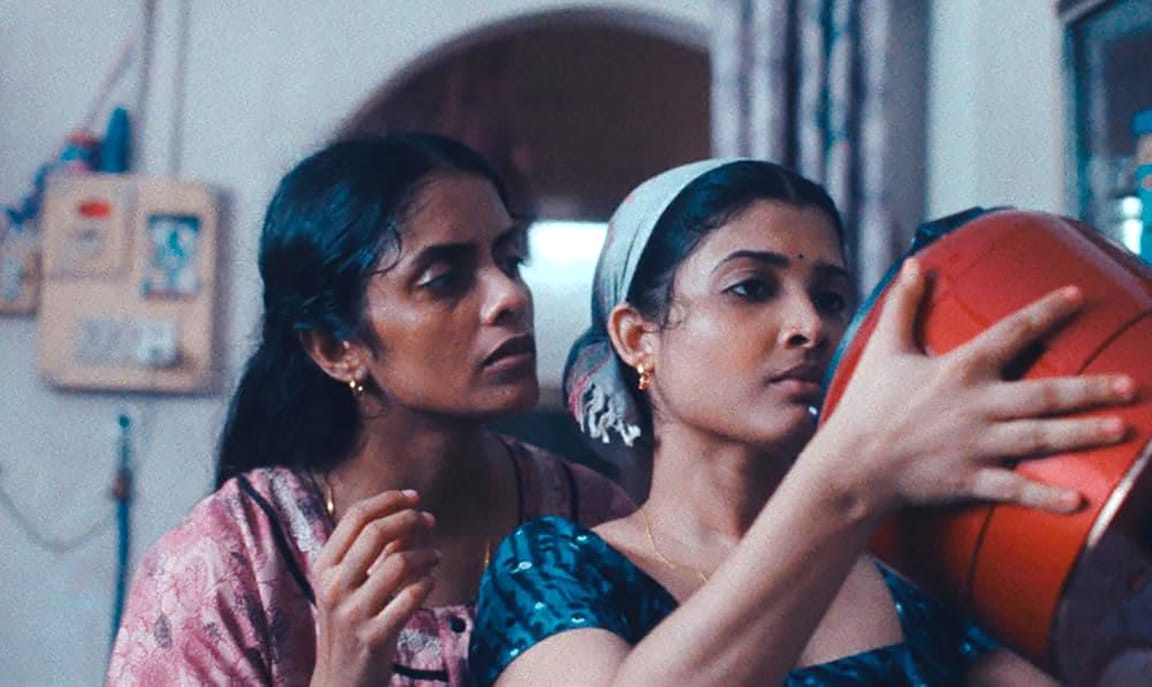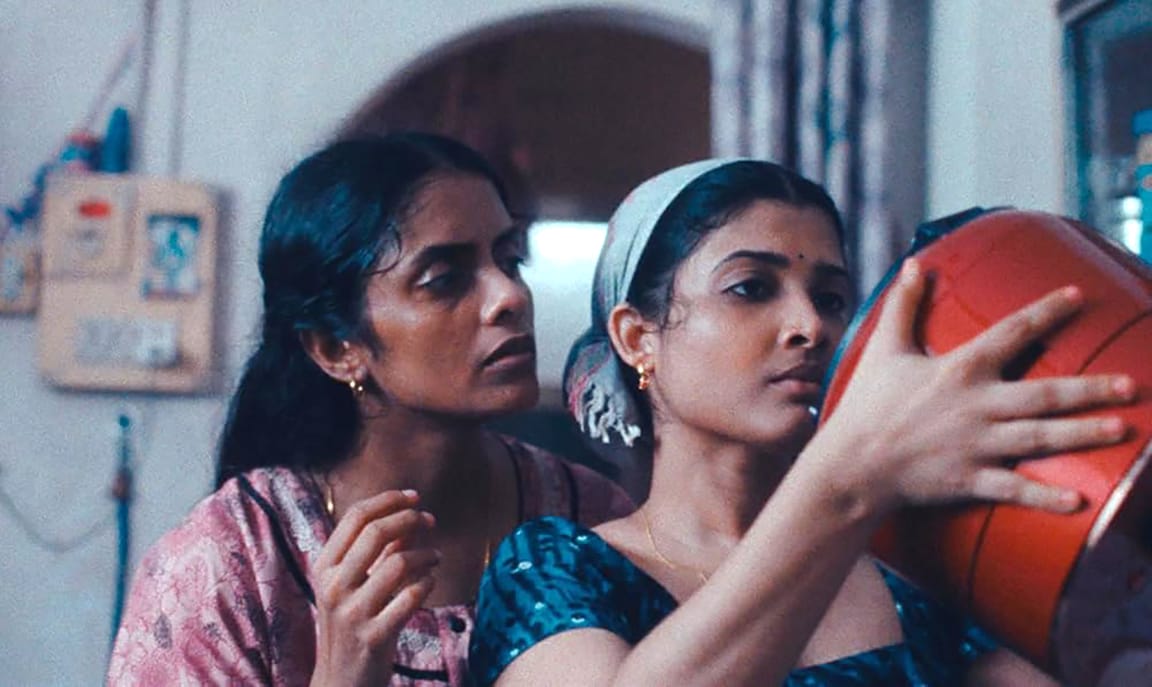 Kani Kusruti and Divya Prabha in All We Imagine as Light (2024)
Today: Fahad Shah, an award winning journalist and editor based in Kashmir.
Issue No. 240An Interview with Payal Kapadia
Fahad Shah
An Interview with Payal Kapadia Kani Kusruti and Divya Prabha in All We Imagine as Light (2024) At 38, Indian screenwriter and filmmaker Payal Kapadia has reached a high place in global cinema. Her film, All We Imagine as Light, is an evocative confluence of friendship, identity, and the quiet resilience of women, in which the haunting blues of monsoon-soaked Mumbai serve as both a visual and emotional anchor, a nod to the layered complexities of life in India’s urban heart. It won the Grand Prix at Cannes and critics’ awards from the New York Film Critics Circle and the Los Angeles Film Critics Association this year, as well as a Best Director nomination at the 2025 Golden Globe Awards. Yet the journey has been far from conventional or easy. To be able not only to tell a story that resonated so deeply with audiences around the world while retaining her integrity as an artist, and competing at global levels, is quite telling of the resilience and earnestness that went into the making of this film. The possibility of an independent Indian film going to the Golden Globes is almost unimaginable, considering the obstacles that face mounting indie films in India in the first place. Daunting funding and distribution challenges ensure that there will be few risk takers supporting those who can tell authentic stories on their own terms. Distribution in particular remains a significant hurdle, with few avenues for smaller films outside the studio system to reach audiences; as a result, India’s independent films often struggle to find their footing in a landscape dominated by the commercialism of the mainstream Indian film industry in Bollywood. All We Imagine as Light was controversially deemed “not Indian enough” …and “a European film” by the establishment Film Federation of India—which, despite the cascade of honors Kapadia’s film has received, declined to select it as this year’s Oscar nominee from India. But All We Imagine As Light continues to gain international acclaim, and was honored again this week with a nomination for the British Academy Film Award (BAFTA) in the category of Film Not in the English Language. Kapadia’s work celebrates India’s diversity, challenging political narratives that seek to homogenize identities. Her choice to shoot in Malayalam—a language often sidelined by Hindi-centric Bollywood—highlights regional Indian cinema’s growing global influence. This multiplicity of viewpoints is reflected in her storytelling, where boundaries between fiction and nonfiction dissolve, drawing viewers into an inclusive world that feels both deeply personal and universally relevant. She sees her achievements as a small step toward a future in which India’s rich, varied cinematic traditions gain international recognition, one independent film at a time. Through her film, Kapadia offers a poignant meditation on identity, community, and the transformative power of storytelling, firmly establishing herself as a visionary filmmaker redefining Indian cinema on a global stage. Inspired by Mumbai’s monsoons and Ratnagiri’s terracotta landscape, Kapadia’s choices evoke a sense of place and emotion, emphasizing the characters’ journeys from stagnation to transformation. I spoke to Kapadia over email last week; here are the excerpts of our conversation, lightly edited for brevity and clarity: Your film, All We Imagine As Light, emphasizes diversity and multiplicity in India. How does this perspective challenge or complement current political narratives? I wanted to make a film that highlights the fundamental nature of my city, Mumbai. It is a city that brings together people from all over the country. There is wide diversity in India which makes it a rich culture—be it religion, language, cultural differences, etc.—these differences are what creates a world that should ideally be more accepting and tolerant, simply because of this diversity. How significant is it for your film, in Malayalam, to be the first Indian film in 30 years to compete for the Palme d'Or and now Golden Globe too, and what does it mean for regional Indian cinema on the global stage? You know the last film that was selected in competition in Cannes was also in Malayalam! Isn't that interesting? It is a state in India that has incredible cinema and wonderful cinema professionals. In fact, we in India see really diverse cinema from different regions including Tamil Nadu, Maharashtra and now even from states in the North East of India, which have so far not got much mainstream industry support. Amazing work is thriving in these states and I am really excited to see what films come out of our country in the coming years. Your previous film, “A Night of Knowing Nothing,” is about student dissent in India; the film shows the strength and courage of students. You had to face hardships after the release of that film. How has that experience made you evolve as a filmmaker? A Night of Knowing Nothing was a film we made with our close friends, born out of our experience as film students. The film taught me a lot and really made me think about filmmaking as a tool to discuss the current zeitgeist of a country. Indian filmmaking is largely overshadowed by Bollywood’s commercial hits, and smaller independent filmmakers often struggle to find audience and space to screen films. Has anything changed in recent years, or do you think it will need time? We have a thriving film industry beyond Bollywood. However, smaller films that are made outside the studio set up do find it hard to get distribution. We faced challenges with our film too. And that was in spite of getting recognition from the Cannes Film Festival. So I think it's a real struggle for most independent filmmakers. Can you tell us about your journey as a filmmaker - what has been the most challenging experience in India as a filmmaker and how different is it in the West, where you are going for the award ceremony next month? Having structural support for independent filmmakers is something that could improve in India. In the West, even in the U.S., there are groups, residencies, film markets, funding bodies etc that help independent filmmakers not just raise money but also create a sense of community. These connections are made between different directors so that you can exchange ideas and share experiences. They also help in connecting to co-producers, and future collaborators. This is now spreading in India too but is still nascent. Netflix initially supported indie films in India, but the focus shifted to big-ticket films, especially post-COVID. With fewer theatrical releases and OTTs dominated by star-driven projects, how can independent filmmakers thrive in this challenging landscape? It is difficult. I am not sure what the solution is. I think the mainstream industry needs to support independent filmmakers by creating spaces where their work can be highlighted. It only costs a fraction of their budgets to make the films we do… surely a little support would go a long way!
R.I.P.Luke O’Neil’s Welcome to Hell World has a beautiful remembrance today on the life and art of David Lynch.
Flaming Hydra will be back on Tuesday, in observance of Martin Luther King Day. We wish you beauty, love, and justice.
Subscribe to FLAMING HYDRA. Just a good idea on multiple levels.
|